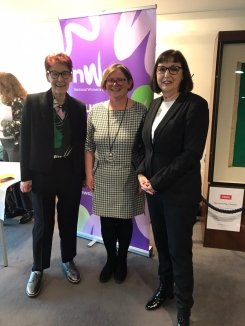Referendum is historic opportunity for women’s equality
Published: Wednesday, May 03, 2023

At a May Day event on Wednesday evening, the National Women’s Council will say recognition of care is critical for workplace equality
The National Women’s Council (NWC) says that while there are significant advances for women in the workplace over the past half century we have not yet reached full equality. Recognition and valuing of Care is critical to achieving economic equality. Women continue to bear an economic cost for care, for childcare and care for older family members which affects their equality during their working lives and in retirement.
Speaking at a May Day event to mark 50 years of the EU in Ireland, NWC Director Orla O’Connor said:
“We have a once-in-a-lifetime opportunity to enshrine equality, not just in the workplace but across society, in November during the equality referendum. It is a chance for us to recognise and reward the care inside and outside the home that people of all genders give and receive. If passed, it will mandate policy makers to implement a policy and cultural change in childcare, elder care, and the rights of disabled people to live independent lives.”
The event celebrates 50 years of the EU in Ireland, as well as NWC’s 50-year anniversary, and speakers looked back at how much women’s equality has advanced in that time.
Aline Brüser, spokesperson for the European Union Trade Confederation (ETUC), said:
“The Pay Transparency Directive is another piece of the puzzle to complete the unfinished revolution of achieving equal pay. In a cost-of-living crisis that disproportionally affects women, EU Member states have no time to lose to implement the new rules urgently and as ambitiously as possible.”
Over the past 50 years, women have gained equal pay legislation, and paid maternity, paternity, parental and parent’s leave. However, women continue to be overrepresented in precarious and low paid jobs, often because of caring responsibilities. The gender pay gap remains stubbornly high, resulting in women having 29% less pension income than men.
Investment in essential public services as well as a culture change towards the equal sharing of care work is vital for women’s equality. This should include a public model of childcare, improved pay for family leave, a universal State pension, a guaranteed living wage, the right to collective bargaining, and gender quotas for women on boards.
Aoife Price of Disabled Women Ireland, also spoke at the event, saying:
“The increased focus on how gender and disability intersect at a European level has positively impacted developments nationally. While progress has been made, more needs to be done to fully realise equality for disabled women and gender minorities in Ireland.”
Ends/
For comment: Orla O’Connor, Aline Brüser and Aoife Price
For more information, please contact Sinéad Nolan, NWC Communications and Social Media Coordinator, 085 8619087 or sineadn@nwci.ie
Notes:
What: Women’s Equality over 50 years: Looking to the past and lessons for the future - Event to mark May Day 2023
When: 3 May, 6pm
Where: Liberty Hall
The event is funded through the Communications Europe Initiative from the Department of Foreign Affairs
About NWC
The National Women’s Council is the leading national representative organisation for women and women’s groups in Ireland, founded in 1973. We have over 190 member groups and a large and growing community of individual supporters.
This year we celebrate 50 years since our foundation with a special calendar of events and campaigns.
The ambition of the National Women’s Council is an Ireland where every woman enjoys true equality and no woman is left behind. This ambition shapes and informs our work, and, with our living values, how we work.
We are a movement-building organisation rooted in our membership, working on the whole island of Ireland. We are also part of the international movement to protect and advance women’s and girls’ rights. Our purpose is to lead action for the achievement of women’s and girls’ equality through mobilising, influencing, and building solidarity. Find out more on www.nwci.ie
